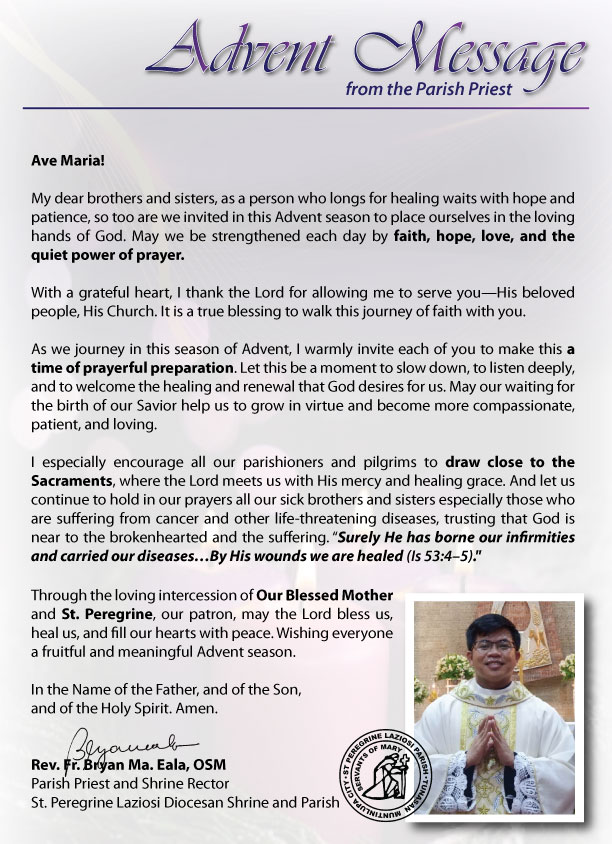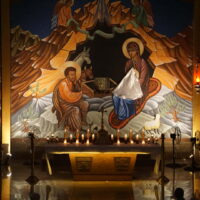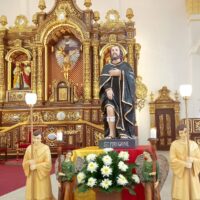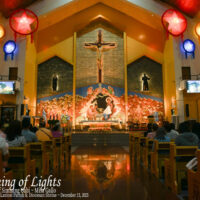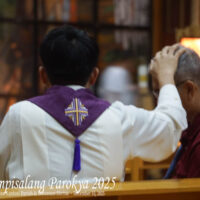Ribbon Placement:
Liturgy of the Hours Vol. III:
Ordinary: 651
Proper of Seasons: 103
Psalter: Saturday, Week II, 958
Office of Readings for Saturday in Ordinary Time
God, come to my assistance.
— Lord, make haste to help me.
Glory to the Father, and to the Son, and to the Holy Spirit:
— as it was in the beginning, is now, and will be for ever. Amen. Alleluia.
HYMN
Ave Maria, gratia plena
Dominus tecum
Benedicta tu in mulieribus
Et benedictus fructus ventris tui, Jesus
Sancta Maria, Mater Dei
Ora pro nobis peccatoribus
Nunc et in hora mortis nostrae
Amen.
English Translation:
Hail Mary, full of grace
The Lord is with thee
Blessed are thou among women
Blessed is the fruit of thy womb, Jesus
Holy Mary, Mother of God
Pray for us sinners
Now, and at the hour of our death
Amen.
| 𝄞 | “Ave Maria” by Gretchen Harris • Musical Score • Title: Ave Maria (Chant); Album: Sing of Mary; Music; Plainsong mode I; vocal: Gretchen Harris; Used with permission; Visit and thank Gretch at http://www.gretchen-harris.com; |
PSALMODY
Ant. 1 None but the Lord has done such marvels; his love endures for ever.
Psalm 136
Paschal hymn
We praise God by recalling his marvelous deeds (Cassiodorus).
I
O give thanks to the Lord for he is good,
for his love endures for ever.
Give thanks to the God of gods,
for his love endures for ever.
Give thanks to the Lord of lords,
for his love endures for ever;
who alone has wrought marvellous works,
for his love endures for ever;
whose wisdom it was made the skies,
for his love endures for ever;
who fixed the earth firmly on the seas,
for his love endures for ever.
It was he who made the great lights,
for his love endures for ever,
the sun to rule in the day,
for his love endures for ever,
the moon and stars in the night,
for his love endures for ever.
Glory to the Father, and to the Son, and to the Holy Spirit:
— as it was in the beginning, is now, and will be for ever. Amen.
Ant. None but the Lord has done such marvels; his love endures for ever.
Ant. 2 He brought Israel out of Egypt with powerful hand and arm outstretched.
II
The first-born of the Egyptians he smote,
for his love endures for ever.
He brought Israel out from their midst,
for his love endures for ever;
arm outstretched, with power in his hand,
for his love endures for ever.
He divided the Red Sea in two,
for his love endures for ever;
he made Israel pass through the midst,
for his love endures for ever;
he flung Pharaoh and his force in the sea,
for his love endures for ever.
Glory to the Father, and to the Son, and to the Holy Spirit:
— as it was in the beginning, is now, and will be for ever. Amen.
Ant. He brought Israel out of Egypt with powerful hand and arm outstretched.
Ant. 3 Give praise to the God of heaven; he has ransomed us from our enemies.
III
Through the desert his people he led,
for his love endures for ever.
Nations in their greatness he struck,
for his love endures for ever.
Kings in their splendor he slew,
for his love endures for ever.
Sihon, king of the Amorites,
for his love endures for ever;
and Og, the king of Bashan,
for his love endures for ever.
He let Israel inherit their land,
for his love endures for ever.
On his servant their land he bestowed,
for his love endures for ever.
He remembered us in our distress,
for his love endures for ever.
And he snatched us away from our foes,
for his love endures for ever.
He gives food to all living things,
for his love endures for ever.
To the God of heaven give thanks,
for his love endures for ever.
Glory to the Father, and to the Son, and to the Holy Spirit:
— as it was in the beginning, is now, and will be for ever. Amen.
Psalm-prayer
God, our Creator, how wonderfully you made us. You transformed dust into your own image and gave it a share in your own nature; yet you are more wonderful in pardoning the one who had rebelled against you. Grant that where sin has abounded, grace may more abound, so that we can become holier through forgiveness and be more grateful to you.
Ant. Give praise to the God of heaven; he has ransomed us from our enemies.
Sacred Silence (indicated by a bell)
A moment to reflect and receive in our hearts the full resonance of the voice of the Holy Spirit and to unite our personal prayer more closely with the word of God and public voice of the Church.
Lord, show me your ways.
— Teach me to walk in your footsteps.
READINGS
First reading
From the book of Deuteronomy
16:1-17
The observance of the feasts
Moses spoke to the people, saying:
“Observe the month of Abib by keeping the Passover of the Lord, your God, since it was in the month of Abib that he brought you by night out of Egypt. You shall offer the Passover sacrifice from your flock or your herd to the Lord, your God, in the place which he chooses as the dwelling place of his name.
“You shall not eat leavened bread with it. For seven days you shall eat with it only unleavened bread, the bread of affliction, that you may remember as long as you live the day of your departure from the land of Egypt; for in frightened haste you left the land of Egypt. Nothing leavened may be found in all your territory for seven days, and none of the meat which you sacrificed on the evening of the first day shall be kept overnight for the next day.
“You may not sacrifice the Passover in any of the communities which the Lord, your God, gives you; only at the place which he chooses as the dwelling place of his name, and in the evening at sunset, on the anniversary of your departure from Egypt, shall you sacrifice the Passover. You shall cook and eat it at the place the Lord, your God, chooses; then in the morning you may return to your tents. For six days you shall eat unleavened bread, and on the seventh there shall be a solemn meeting in honor of the Lord, your God; on that day you shall not do any sort of work.
“You shall count off seven weeks, computing them from the day when the sickle is first put to the standing grain. You shall then keep the feast of Weeks in honor of the Lord, your God, and the measure of your own freewill offering shall be in proportion to the blessing the Lord, your God, has bestowed on you. In the place which the Lord, your God, chooses as the dwelling place of his name, you shall make merry in his presence together with your son and daughter, your male and female slave, and the Levite who belongs to your community, as well as the alien, the orphan and the widow among you. Remember that you too were once slaves in Egypt, and carry out these statutes carefully.
“You shall celebrate the feast of Booths for seven days, when you have gathered in the produce from your threshing floor and wine press. You shall make merry at your feast, together with your son and daughter, your male and female slave, and also the Levite, the alien, the orphan and the widow who belong to your community. For seven days you shall celebrate this pilgrim feast in honor of the Lord, your God, in the place which he chooses; since the Lord, your God, has blessed you in all your crops and in all your undertakings, you shall do nought but make merry.
“Three times a year, then, every male among you shall appear before the Lord, your God, in the place which he chooses: at the feast of Unleavened Bread, at the feast of Weeks, and at the feast of Booths. No one shall appear before the Lord empty-handed, but each of you with as much as he can give, in proportion to the blessings which the Lord, your God, has bestowed on you.”
RESPONSORY Deuteronomy 16:14, 15; Nahum 1:15
Your feast must be a time of rejoicing for you and your son and your daughter, for the Levite too, and the stranger, for the orphan and the widow;
— and then the Lord will bless you and fill you with joy.
See, even now over the mountain the messenger of good tidings comes! Peace, he cries out. Rejoice, Judah, and celebrate your feasts.
— And then the Lord will bless you and fill you with joy.
Second reading
From the treatise Against Heresies by Saint Irenaeus, bishop
The pure oblation of the Church
The oblation of the Church, which the Lord taught was to be offered throughout the whole world, has been regarded by God as a pure sacrifice, and is acceptable to him. Not that he needs sacrifice from us, but the one who makes the offering himself receives glory in his offering, provided that his gift is accepted. Through a gift both honor and love are shown to a king.
The Lord wants us to make our offering in all sincerity and freedom from sin. He declared this when he said: When, therefore, you offer your gift at the altar and remember that your brothers holds something against you, leave your gift before the altar, and first go and be reconciled with your brother; and then come back and offer your gift.
We must offer God the first fruits of his creation, as Moses said: You will not come empty-handed into the presence of the Lord your God. In showing gratitude to God for his gifts man is to be accounted pleasing to God, and so receive the honor that comes from God.
It is not oblations as such that have met with disapproval. There were oblations of old; there are oblations now. There were sacrifices among the people of Israel; there are sacrifices in the Church. Only the kind of oblation has been changed: now it is offered by freemen, not by slaves. There is one and the same Lord, but the character of an oblation made by slaves is distinctive, so too that of an oblation made by sons: their oblations bear the mark of freedom.
With God there is nothing without purpose, nothing without its meaning and reason. Thus the people of Israel used to dedicate tithes of their possessions. But those who have been given freedom devote what they possess to the Lord’s use. They give it all to him, not simply what is of lesser value, cheerfully and freely because they hope for greater things, like the poor widow who put into God’s treasury her whole livelihood.
We must make oblation to God, and in all things be found pleasing to God the Creator, in sound teaching, in sincere faith, in firm hope, in ardent love, as we offer the first fruits of the creatures that are his. The Church alone offers this pure oblation to the Creator when it makes its offering to him from his creation, with thanksgiving.
We offer him what is his, and so we proclaim communion and unity and profess our belief in the resurrection of flesh and spirit. Just as bread from the earth, when it receives the invocation of God, is no longer common bread but the Eucharist, made up of two elements, one earthly and one heavenly, so also our bodies, in receiving the Eucharist, are no longer corruptible, for they have the hope of resurrection.
RESPONSORY Hebrews 10:1, 14; Ephesians 5:2
The law was but a shadow of the good things to come, not a living likeness of them. With the same sacrifices repeatedly offered year after year, it can never bring men to perfection.
— Christ made one offering, himself, and by virtue of it he made those who believe in him holy for ever.
Christ loved us, and gave himself up to death for us as an offering and sacrifice to God.
— Christ made one offering, himself, and by virtue of it he made those who believe in him holy for ever.
CONCLUDING PRAYER
Almighty ever-living God,
who govern all things,
both in heaven and on earth,
mercifully hear the pleading of your people
and bestow your peace on our times.
Through our Lord Jesus Christ, your Son,
who lives and reigns with you in the unity of the Holy Spirit,
God, for ever and ever.
— Amen.
Acclamation (at least in the communal celebration)
Let us praise the Lord.
— And give him thanks.
 Diocese of Parañaque
Diocese of Parañaque


